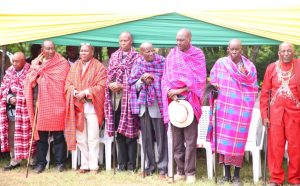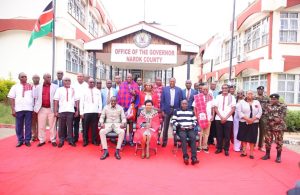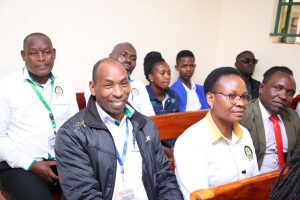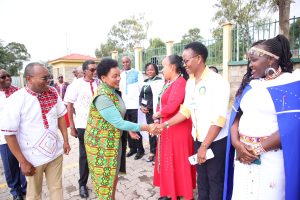DCJ Mwilu calls for gender equality and justice in the implementation of AJS
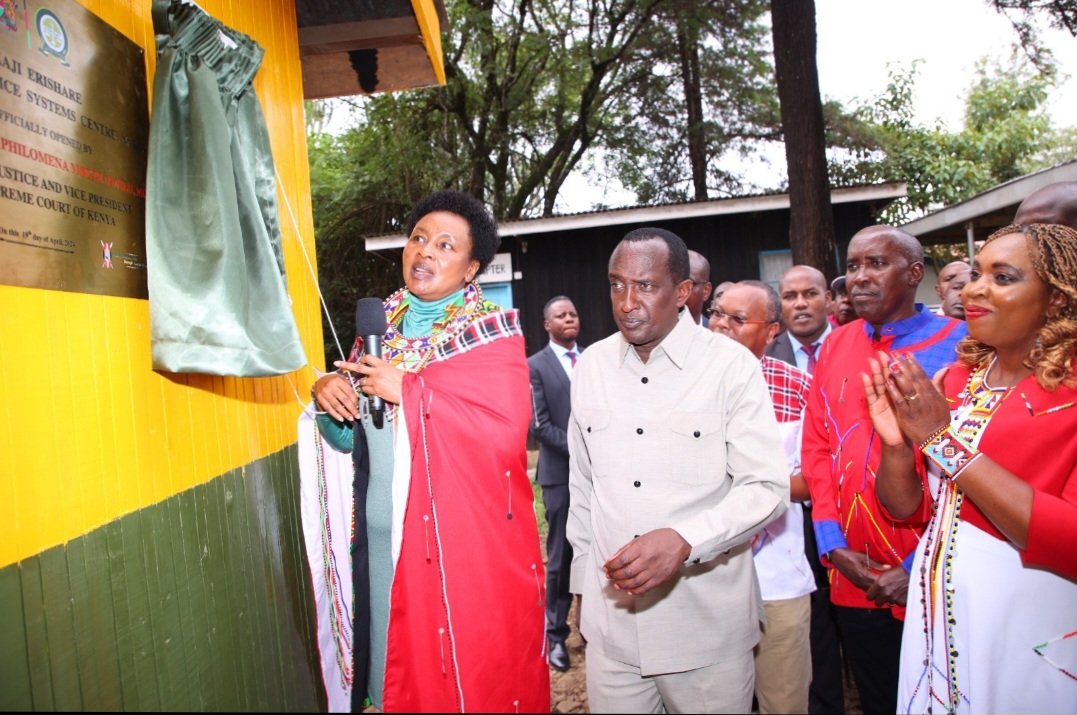
Deputy Chief Justice Philomena Mbete Mwilu has called for gender equality, equity and justice in the implementation of Alternative Justice Systems mechanism both in composition and process.
The DCJ noted that the major challenge affecting the legitimacy of the AJS mechanism is that it disfavors women and girls and fails to accord them the rights due to them.
“This failure to protect the rights of women flows from the nature of the societal relations that are reflected in AJS mechanisms; relations based on patriarchal and/or discriminatory structures, where women’s individual interests were subsumed under the ‘interests’ of the group. This societal balance finds itself reflected in AJS mechanisms,“ said DCJ Mwilu.
Speaking during the launch of Narok AJS Centre, the DCJ emphasized that customs, norms and practices within our communities and hence within our AJS mechanisms are not ossified and static and thus we must abandon the assumption that AJS practitioners, especially elders who come from communities in which harmful and discriminatory cultural practices occur and/or prevalent, are disinterested or incapable of shifting beliefs and practices to comply with constitutional requirements.
She noted that there was increased recognition amongst AJS practitioners that there can be no legitimacy where the composition, operations and decisions of these mechanisms are unconstitutional and/or result in rights violations and discrimination particularly in matters relating to marriage, matrimonial property, inheritance, succession, land tenure, and in gender-related cases such as those involving sexual offences, FGM, early marriages and/or domestic violence.
According to Narok County Action Plan, the DCJ observed that a number of justice challenges in the County include multiple forms of gender-based violence, including sexual violence, that are prevalent across the county but often normalized, underreported, and concealed.
“To deal with the ills mentioned above, it is necessary to ensure that the existing forms of Alternative Justice Systems in Narok are constitutionally compliant and operate within the outer boundaries set out in Article 159(3) of the Constitution,” said Lady Justice Philomena Mwilu
Justice Mwilu said that the Judiciary must learn from AJS processes and techniques that, to significant extents, make the justice they dispense more organic and permeating.
“The discursive techniques they implement, the responsiveness to contextuality, their appreciation of more holistic ideas of justice and a more complete consideration of both the individual and the community are a few areas from which the Judiciary can seek to improve its justice practices” noted Justice Mwilu.
The DCJ observed that the Narok AJS CAP will provide an opportunity for cross-fertilisation of ideas and methods between all justice practices and mechanisms; interactions that will improve each and deepen justice provision across the county.
The DCJ said that the people centred justice concept of AJS was at the core of the Social Transformation Through Access to Justice (STAJ) institutional blueprint the Judiciary is currently implementing.
“The STAJ blueprint champions a multi-door approach to access to justice as a critical pathway towards social transformation. This approach finds further expression in the Traditional, Informal and Other Mechanisms Used to Access Justice in Kenya (Alternative Justice Systems) Policy the Judiciary has been implementing since August 2020” Said the DCJ
Justice Joel Ngugi on his part noted that the Narok was the fifth county to implement the Judiciary AJS policy after Kajiado, Nakuru, Mandera and Turkana. This, he said was a commendable milestone and the Judiciary aims to get County AJS Plans for all 47 Counties.
Judge Ngugi said that AJS County Action Plans are a unique innovation in including citizens and communities in advancing access to justice while making use of Kenya’s devolved system of governance and public participation.
“They are the first truly citizen-centric, community-led strategies in not only improving the quality and speed of justice but also in bridging the justice gap for, especially, vulnerable communities who have been historically under served by the court system”. Said Justice Ngugi
Speaking at the same function, Narok County Governor Patrick Ole Ntutu promised that his administration will prioritize supporting elders in dispute resolution, recognizing their vital role as custodians of traditional wisdom, and conflict resolution mechanisms.
“By empowering these elders and providing resources, our county government will indeed enable communities to resolve disputes amicably, thus relieving pressure and backlogs on formal judicial systems”. Said Governor Ntutu
The governor said that there must be continuous innovation to meet the evolving needs of communities in order to create a fairer society.
“With this in mind, I propose a bold step: making participation in AJS first priority for all the legal matters that qualify for this process before resorting to formal court proceedings. Narok is a vast county and courts are often as far as 300km from citizens. AJS could revolutionize our justice system, enhancing efficiency, reducing backlogs, and promoting reconciliation and healing”. Said the Narok Governor
Kajiado Governor, Joseph ole Lenku, who was a guest during the ceremony noted that Kajiado was the first county to adopt AJS and so far 140 out of 200 cases have been resolved. He noted that unlike the court system where one-size-fits-all, AJS county models are tailored to meet specific challenges facing that county, be they FGM, land, illicit brew or cattle rustling. Justice through AJS is served in a short time allowing communities to continue with their lives.”





